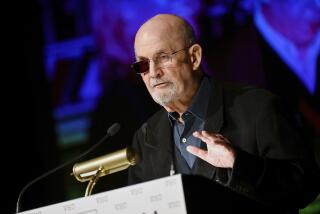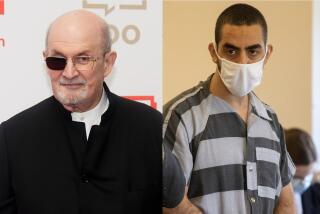Rushdie’s Unborn ‘Children’
- Share via
LONDON — It was to be Britain’s biggest, most prestigious TV drama production of 1998, a lavish five-part serial based on a novel widely agreed to be among the finest written in the latter half of this century.
A massive 110 speaking parts had been cast. The first sets were already built, and cameras were due to start rolling on Jan. 26 for four months of filming. Tentative broadcast dates had been set for October or November.
It isn’t going to happen. Indeed, it may never happen. The BBC’s plans to adapt Salman Rushdie’s masterpiece “Midnight’s Children” have fallen foul of intolerance, censorship and international politicking of extraordinary complexity. The Iran-led fatwa against Rushdie, announced in 1989 over the publication of his novel “The Satanic Verses,” which enraged Islamic fundamentalists, has once again dogged both his creative and his personal life.
Since then he has been unable to move freely in public for fear of being murdered. He lives undercover, protected by bodyguards assigned him by the British government. The price on his head was increased last year by Iran’s 15 Khordad organization to the equivalent of $2.4 million. Now it appears that not just “The Satanic Verses” but also his other works are liable to be stifled in any countries where Iran exerts influence.
“Midnight’s Children,” a rich, sprawling account of events (told from both Hindu and Muslim perspectives) leading to India’s independence in 1947 and the following 30 years, was to be shot in Sri Lanka, whose government had given its blessing. Locations had been scouted and a production office established in its capital city, Colombo.
Then in late November the BBC received a letter from the Sri Lankan authorities, withdrawing permission without stating a reason. “We had no option but to announce the production was on hold indefinitely,” said a BBC spokesman.
One sad aspect of this is what an outstanding piece of television “Midnight’s Children” might be. The novel itself virtually begs to be adapted--its largely linear narrative spans several generations, and monumental historical events unfold around its main characters. And Rushdie’s vast TV script, which totals 246 pages, achieves the rare feat of shaping an astonishingly powerful work from one medium and investing it with comparable power in another form.
The BBC’s copy of the shooting script intriguingly bears neither the author’s name nor the novel’s, presumably for security reasons. In this draft--his fifth--Rushdie has distilled the essence of his book, while retaining its brilliantly visual qualities and its panoramic sweep. To see this translated to the small screen would be an enticing prospect.
“It’s one of the most intense projects I’ve ever done,” said Rushdie by phone, sounding weary and disheartened. “I worked on it intensively for 15 months. I would have finished a novel in that time, but that novel is now still 10 months away.”
Is there still hope? “I think for the moment, no,” said producer Christopher Hall gloomily. “We need Indian people and Indian-looking architecture. But I imagine anywhere we chose to shoot on the subcontinent, we would be chased out.”
“Midnight’s Children” could conceivably be filmed on a Hollywood back lot with constructed Indian-style facades, but that would increase the project’s costs several times over. (Neither Hall nor the BBC would confirm the exact level of the proposed budget.)
Originally “Midnight’s Children” was to be shot in India. But last summer, it became clear Indian authorities would not permit filming.
Since the fatwa, Rushdie’s relationship with India has been adversarial. “I’ve been a British citizen since 1964, but I’m an Indian citizen by birth,” said Rushdie. “So I have the right to return. But India won’t give me permission to return.
“I own property in India which the government tried to seize. I won that legal fight, but I still can’t visit my property--though there are laws entitling other property owners to do so.”
Given this history--and the country’s huge Muslim population--hostility to a Rushdie novel being filmed in India might have been predicted. But Rushdie found the manner of India’s rejection hurtful. “They gave no reason for turning me down,” he recalled, “but an unnamed Indian official said while there was no objection to the novel ‘Midnight’s Children,’ they felt it would be prudent to avoid giving the mistaken impression they in any way supported the author.”
Sri Lanka, though, had seemed promising. “We were surprised by the rejection from Sri Lanka,” admitted Hall. “It’s a largely Buddhist country. Only 7% of its people are Muslim, and only seven out of 168 [members of Parliament]. And the Muslims are not the ruling class--they’re the merchants, the shopkeepers. They’re not at the forefront of policy at all.”
Hall felt relieved when Sri Lanka initially agreed to host the filming. “We started casting in London, Colombo and Bombay. I felt secure. We thought governments generally needed not to go back on their word, for fear it might be construed as weakness.”
But there is a vast backdrop of political intrigue behind the two nations’ decision not to allow filming. Rushdie talked of gas and oil pipelines linking Iran and India via the Persian Gulf. He alluded to India’s desire to remain friendly with Iran, which has extended to voting with them against United Nations motions deploring the fatwa.
As for Sri Lanka, some of its seven Muslim members of Parliament are partly sponsored by the Iranian and Saudi governments. Hall said that when plans to film “Midnight’s Children” were announced, the Sri Lankan ambassador in Tehran was called in for some blunt talks.
“Iran pressurized Sri Lanka strongly,” added Rushdie. “This included making menacing remarks about the status of Sri Lanka nationals in Iran, most of whom are domestic workers.”
What finally deep-sixed “Midnight’s Children” was the Sri Lankan government’s wish to pass a strongly opposed devolution legislation. Three Muslim members of Parliament in particular appear to have made reversing permission to film the cost of their votes.
“Salman is a demonized figure and a convenient target,” said Hall resignedly. “And in such circumstances, a mere TV project becomes not very important at all.”
The notion to adapt “Midnight’s Children” has been widely talked about since 1993 when the novel, which won the 1981 Booker Prize, was voted the best novel ever to win the award.
Back then, both the BBC and Channel 4 were eager to adapt the work. Rushdie plumped for the BBC: “I knew and liked people there. The relationship with the BBC has been terrific all the way through. The corporation has [tried everything to] get this made.”
The task of turning “Midnight’s Children” into 290 minutes of television was originally given to another writer. But the script submitted did not encourage the BBC to start considering shooting budgets. Nor was it attracting top-flight directors. In 1996 Rushdie started adapting his own work from scratch.
The BBC entrusted two men with impressive bloodlines to deliver “Midnight’s Children” to the screen; director Tristram Powell is the son of novelist Anthony (who wrote the “Dance to the Music of Time” series of novels), while producer Christopher Hall is the son of theater and opera director Sir Peter Hall.
The rebuff from Sri Lanka has caused understandable nervousness within the BBC about the serial’s prospects; the corporation would need strong assurances that the Sri Lanka scenario would not be repeated elsewhere. (Fortunately for the BBC, no actors were under contract when filming permission was reversed.)
These events also raise doubts about whether any of Rushdie’s books will ever be adapted. “Now he’s back on the political agenda,” Hall said with a sigh. “My worry is other producers won’t want to touch his other work.” The irony is that “Midnight’s Children” is scrupulously evenhanded in its treatment of India’s religious communities. “Had we succeeded in doing this, we’d have helped depoliticize Salman Rushdie,” said Hall. “There’s nothing in ‘Midnight’s Children’ to offend Muslim sensibilities.” That much is true. The novel has been translated into 25 languages, has sold 5 million copies worldwide and is available in Indian and Sri Lankan bookshops, which makes the ban on filming more illogical.
Rushdie sounds angrier yet less gloomy than Hall or BBC executives. “The whole episode shows how reluctant governments are to make the smallest declaration of principle against small amounts of unscrupulous protests,” he said.
He is awaiting the outcome of the upcoming Indian elections, to see if the country’s political climate changes. He noted that some people already serving in the Indian government want to see “Midnight’s Children” filmed in their country.
“The whole thing might yet happen,” he said flatly. “It’s not going to happen fast. But hope springs eternal.”
More to Read
The complete guide to home viewing
Get Screen Gab for everything about the TV shows and streaming movies everyone’s talking about.
You may occasionally receive promotional content from the Los Angeles Times.






